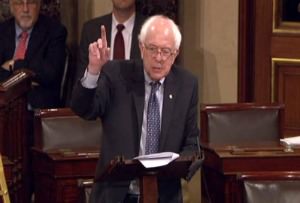Low Taxes Are the Problem, Not the Solution
The only way to reduce the uncertainty in our economy right now is to increase taxes. During the Eisenhower years the top tax rate was 91 percent, and there is every reason to return to this rate now.The only way to reduce the uncertainty in our economy right now is to increase taxes on the rich.
“Every economist that I’ve talked to … acknowledges that this [tax] agreement would boost economic growth in the coming years and has the potential to create millions of jobs,” President Barack Obama said this week. But if low taxes are the solution, this must mean that high taxes are the problem. Yet the Bush tax cuts are already in effect; taxes are therefore low already, and the unemployment rate is nevertheless close to the same level that it was at a year ago and has risen in the last month. Nor did the Bush tax cuts boost the economy after they were passed in 2003, their name — “The Jobs and Growth Tax Relief Act” — notwithstanding. In fact, the evidence shows that tax policies alone have no effect on the state of the economy. What is the problem, then?
The problem is that the level of uncertainty in the economy is so high that investors and entrepreneurs — not buyers and sellers of stocks on Wall Street but actual investors who build or expand places of work and install new pieces of equipment and machinery in them — have lost confidence in their own ability to predict what a good investment will be. With such uncertainty, it is no wonder that investors are not borrowing and that banks are not lending.
If uncertainty and a low level of investment are the problem, what is the solution? The current uncertainty in the economy was brought about by the subprime crisis, and there is little that the government can do to decrease it. But there is a lot that the government can do to increase uncertainty, and President Obama and the Republicans are doing it all.
At exactly the same time that the President’s Deficit Commission announced its recommendations about how to reduce our deficits, including the projected deficit within the Social Security system, Obama has announced an agreement for the continuation of the Bush-era tax cuts for the rich and a reduction of 2 percent in the Social Security tax for all. Only a fool would invest in an economy with deficits that are not only huge but are being increased deliberately at exactly the time that Obama himself has said that they must be reduced.
But reducing the deficits without increasing taxes will require increases in the prices of all government-provided goods and services, including university education, public transportation and parks, and services that were until now free will no longer be. (In several cities people now have to pay a “crash tax” for ambulance and firefighting if they are in a car accident to which such emergency units respond.) The result will be a significant decrease in the purchasing power of middle-income families that calls for decreasing, instead of increasing, production capacity and investment.
It is not inconceivable that 13 months from now, after the extension of unemployment benefits expires, the Obama/Republican plan will result in the kind of street riots we’ve begun to see across Europe, led here by the unemployed. The larger-than-ever deficit will make renewing the extension of unemployment benefits unacceptable, particularly to a Republican-dominated House. University students fed up with higher tuitions and employed workers fed up with the high prices for government services could even join in. In an economy with an impoverished middle class and political instability, investors will become even harder to find.
The only way to reduce the uncertainty in our economy right now is to increase taxes. During the Eisenhower years the top tax rate was 91 percent, and there is every reason to return to this rate now. Nevertheless, even after taxes are raised it will take some time for investments to flow. This is because in addition to the uncertainty, the damage that the subprime crisis inflicted — not on banks, but on homeowners and other victims — remains very real.
How might investments be increased in the meantime, then? Private investors are not the only ones capable of investing. When it comes to the government, there is no uncertainty about what good investments are. Our needs are self-evident and the list is long. We need more schools and more teachers. We need more universities and more medical schools. We need to repair our roads and fix our bridges. Practically all our public services are in dire need of investments, and the number of jobs these investments could create would far exceed the number of the unemployed.
Extending the Bush tax cuts and reducing the Social Security tax will only increase the level of uncertainty in the economy and discourage investment. Only by taxing the rich can we close the deficit, reduce uncertainty and begin to make public investments, both because we desperately need them and because we desperately need the jobs that they will create.
Moshe Adler teaches economics at Columbia University. This piece is based on his book “Economics for the Rest of Us: Debunking the Science That Makes Life Dismal” (The New Press).
Your support matters…Independent journalism is under threat and overshadowed by heavily funded mainstream media.
You can help level the playing field. Become a member.
Your tax-deductible contribution keeps us digging beneath the headlines to give you thought-provoking, investigative reporting and analysis that unearths what's really happening- without compromise.
Give today to support our courageous, independent journalists.






You need to be a supporter to comment.
There are currently no responses to this article.
Be the first to respond.